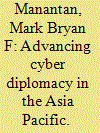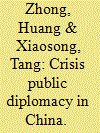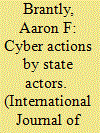| Srl | Item |
| 1 |
ID:
181940


|
|
|
|
|
| Summary/Abstract |
The stability in the cyber domain is rapidly deteriorating on several fronts marked by increasing sophistication of cyberattacks, declining consensus on global internet governance and intensifying great power competition. These challenges were critical turning points among nation-states to recalibrate prevailing cyber diplomatic engagements. This article investigates the increasing prominence of deterrence in the practice of cyber diplomacy in the Asia Pacific. Using Japan and Australia as case studies, it argues that both states continue to adhere to the conceptual tenets of cyber diplomacy, however, in practice, there is a growing integration of deterrence—cyber capabilities and public attribution/naming and shaming—in the equation at varying degrees and intensities. The article endeavours to make two important contributions: First, revitalize the existing cyber diplomacy framework by challenging the extant literature’s view of deterrence’s limited application—underpinned by cold war analogies—and the implausibility of conducting attribution of cyberattacks. Secondly, evaluate Japan and Australia’s cyber diplomacy based on empirical evidence. Key findings suggest that deterrence reinforces/complements the fundamental elements present in the cyber diplomacy playbook. While slight variation exists, there is a strong acquiescence between Japan and Australia to expand existing cyber cooperation to tackle critical and emerging technologies, supply chain, and data governance.
|
|
|
|
|
|
|
|
|
|
|
|
|
|
|
|
| 2 |
ID:
132044


|
|
|
|
|
| Publication |
2014.
|
| Summary/Abstract |
Leon Trotsky, founder of the Soviet Red Army, once lamented "You Lmay not be interested in war, but war is interested in you".' His words are highly relevant to crisis public diplomacy today. Although not enough attention is paid to it, crisis public diplomacy is destined to become vital and complementary to other diplomacies in an era of frequent crisis. It mestic diplomatic strategies and appears to be very conspicuous in international affairs. This was clearly indicated in the report made by former General Secretary Hu Jintao at the 18th Congress of the CPC (Communist Party of China), as follows: "At present, as the global, national and our Party's conditions continue to undergo profound changes, we are faced with unprecedented opportunities for development as well as risks and challenges unknown before." Having a clear understanding of different situations, guarding against risks, dealing with challenges, solving crises and exploiting opportunities have become very real issues. China needs to follow the trend and engage in crisis public pressing times. Through overall coordination it will be control crises. and establish a positive image plays a prominent role in do diplomacy in these able to erase risks to security
|
|
|
|
|
|
|
|
|
|
|
|
|
|
|
|
| 3 |
ID:
132419


|
|
|
|
|
| Publication |
2014.
|
| Summary/Abstract |
Covert action is as old as political man. The subversive manipulation of others is nothing new. It has been written about since Sun Tzu and Kautilya. People and nations have always sought the use of shadowy means to influence situations and events. Covert action is and has been a staple of the state system. A dark and nefarious tool often banished to philosophical and intellectual exile, covert action is in truth an oft-used method of achieving utility that is frequently overlooked by academics. Modern scholars contend that, for utility to be achieved, activities such as war and diplomacy must be conducted transparently. Examined here is the construction of utility for a subset of covert action: cyber attacks.
|
|
|
|
|
|
|
|
|
|
|
|
|
|
|
|